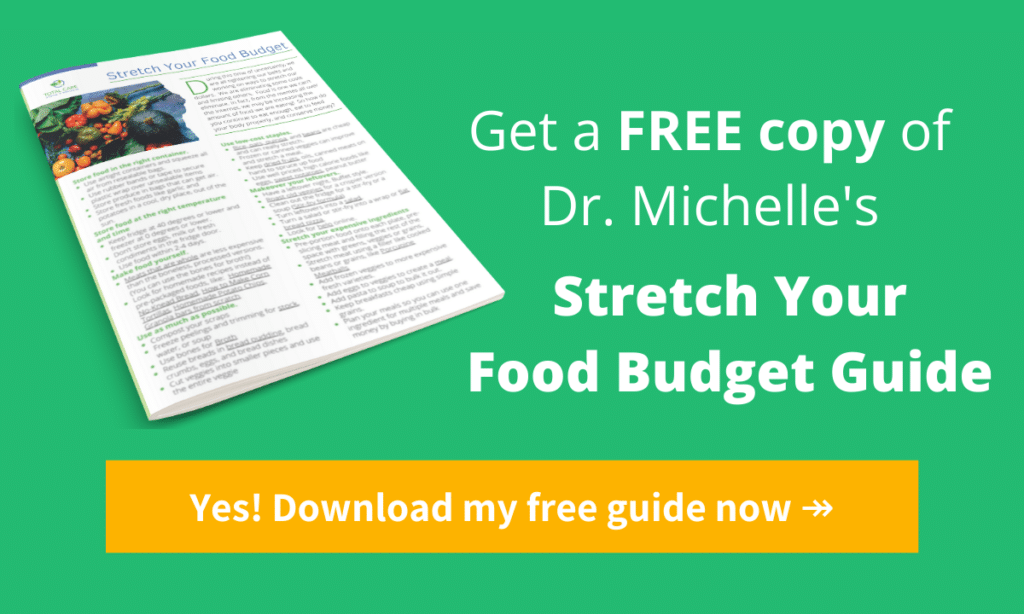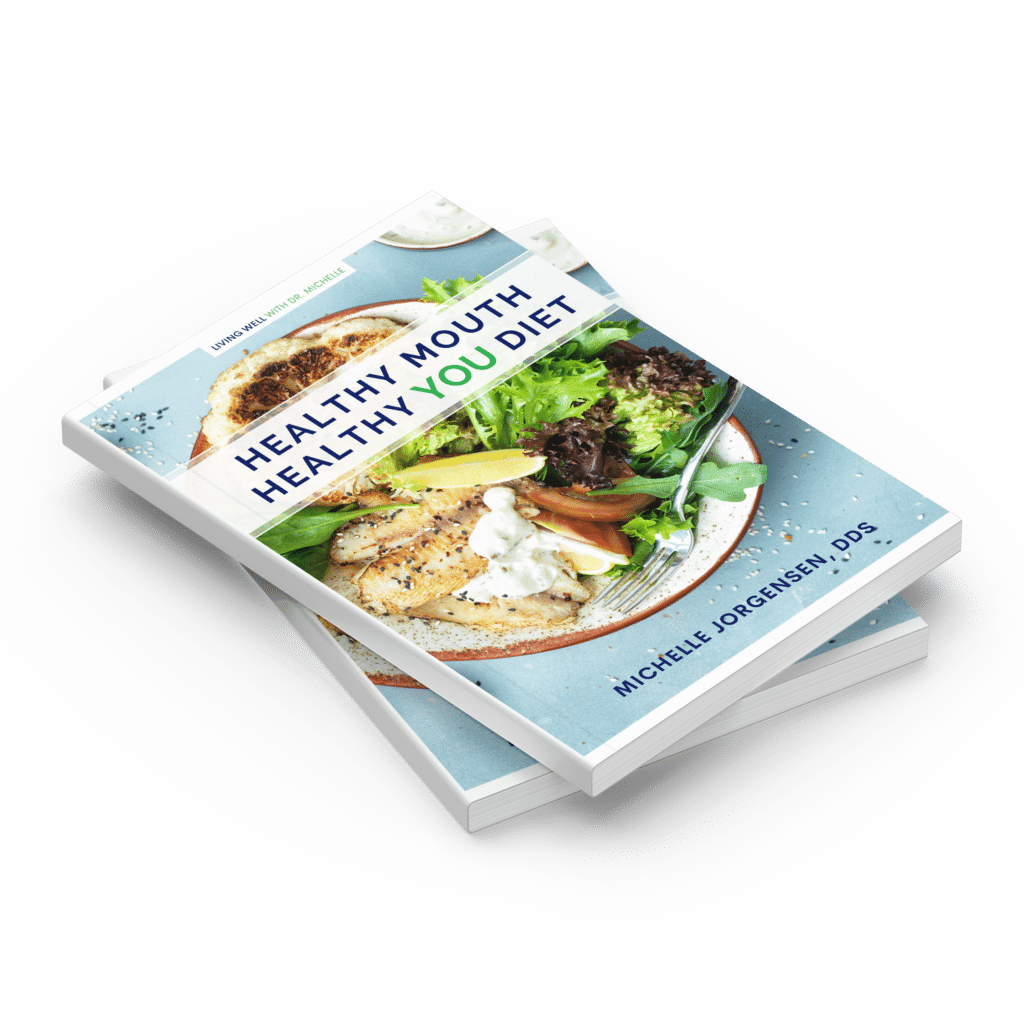Health Info » Living Well Lifestyle Tips » How to Make Your Food Budget Stretch
How to Make Your Food Budget Stretch
Table of Contents
By Dr. Michelle Jorgensen
I know that many of you are wondering right now how to make your food budget stretch!
During this time of uncertainty, we are all tightening our belts and working on ways to stretch our dollars. We are eliminating as many costs as possible and limiting others.
Food is one we can’t eliminate, in fact, from the memes all over the internet, we may be increasing the amount of food we are eating!
So how do you continue to
- Eat enough
- Eat to feed your body properly, and
- Conserve money
This week’s blog is all about How to Make your Food Budget Stretch!
Make sure you download the “Stretch your Food Budget” guide and watch my video showing you some of the things I do in my own kitchen!
These are things we can and should be doing in good times and bad. Why not make the most of your dollar and feed yourself and your family well?!
Let’s learn how to do this together!
Store Food Properly So it Lasts
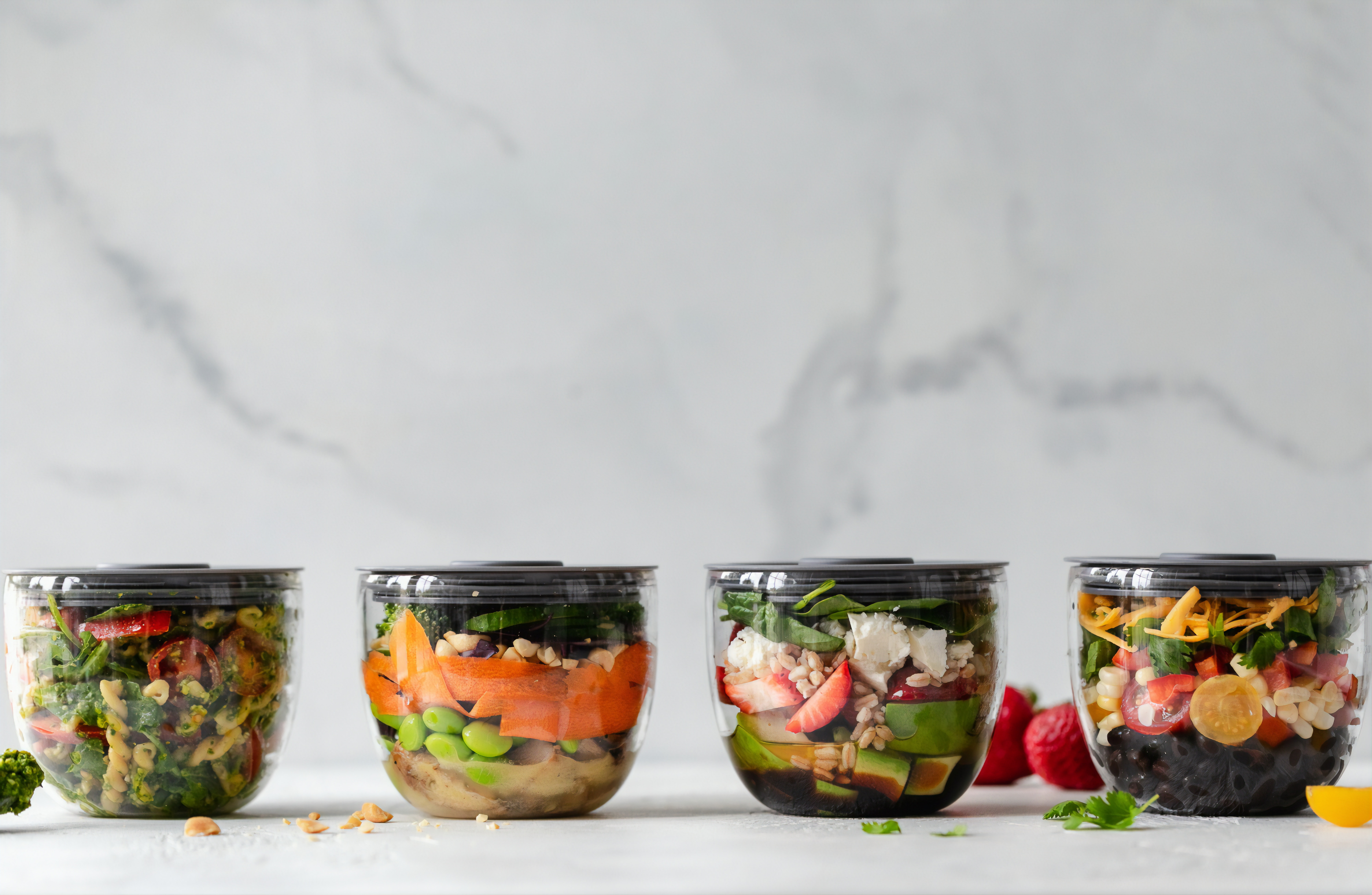
Did you know a typical American family throws away 1/3 of the food they purchase? That’s food that spoils and food that doesn’t get eaten…and it costs us thousands of dollars every year.
Step #1- The Container or Wrapping: Air is what causes food to spoil, so the container you choose to store your food in needs to be airtight.
- Put lids and caps on tight, squeeze the air out of resealable bags, and use rubber bands or tape to secure the plastic wrap to items that aren’t sealable.
- Remove bulk meat from the store packages and repackage it in resealable bags or wrap it tightly to put in the freezer.
- Freeze bulk items in separate packages in the amounts you will use at one time.
- Use the right size container. A container that is too large will speed up spoilage or freezer burn.
- To protect dry staples such as flour and rice from bugs, add a couple of dry bay leaves.
- For produce, store in bags that can get some air. Puncture a resealable bag in a few places to let some air in.
- For fresh foods like garlic and potatoes, store them in a cool, dry place, out of the sun.
Step #2 – Temperature and Time. A little too warm can mean spoilage so check your fridge and freezer and rotate food frequently.
- Your fridge should be 40 degrees or lower and your freezer 0 degrees or lower. Use a thermometer.
- The door is a few degrees warmer, so don’t store eggs, milk or fresh condiments there.
- Don’t put hot food into the fridge or freezer– it will raise the temperature of the entire fridge. Submerge it in cold water to cool or put it into smaller containers.
- Label food or rotate every day to avoid “losing it” in the back of the fridge. Use food within 2-4 days. Slimy is always bad!
Make Food yourself
A little more work for a lot less money
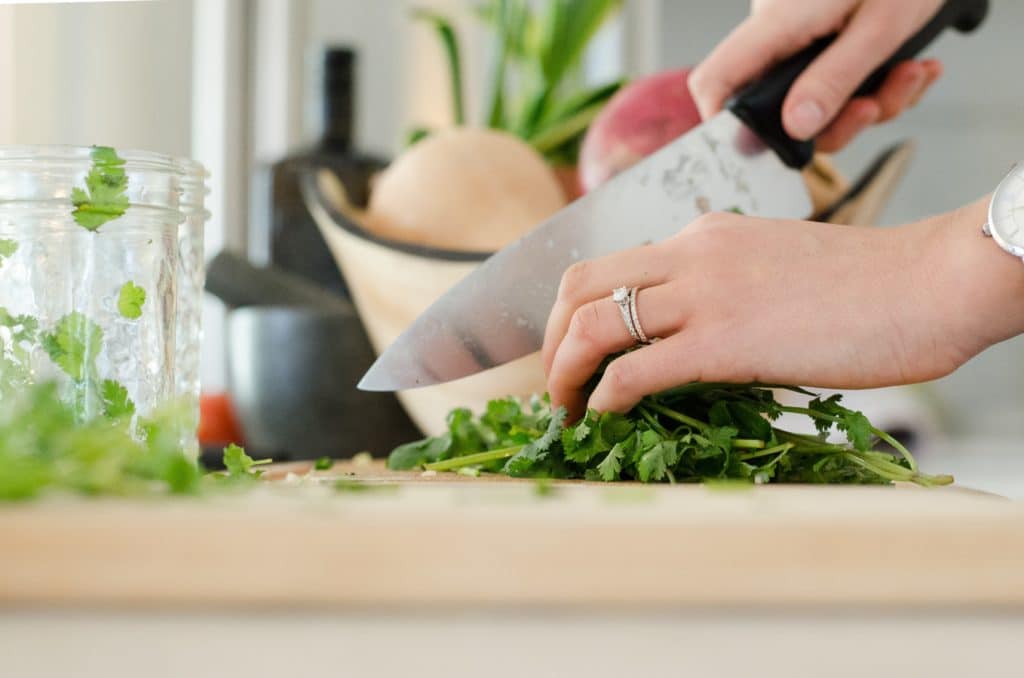
- Beans and grains can be cooked yourself easily and for pennies.
- Meats that are whole are much less expensive than the boneless skinless breasts or the chicken nuggets. And use the bones for broth!
- Here is an article to help you with a whole chicken if you aren’t used to working with one yet. How to break down a whole chicken
- Deli items are much less expensive in bulk rather than already prepared. Cheese blocks are $2-5 per pound, and the pre-shredded cheese can be $4-10 a pound!
- Pre-packaged and prepared foods are expensive.
Use As Much As Possible
You can use much of what you send down the garbage disposal or into the trash
- Compost your scraps if nothing else
- Freeze peelings and trimming – they are great to throw in water for stock or soup. Make stock with scraps
- Bones are great for broth. How to make bone broth
- Use broccoli and cauliflower stems for stir-fry. Broccoli stem stirfry
- Bread can be reused in bread pudding, croutons, bread crumbs, and eggs and bread dishes. Easy Bread Pudding
Use low-cost staples
Some of these foods are pennies and very filling
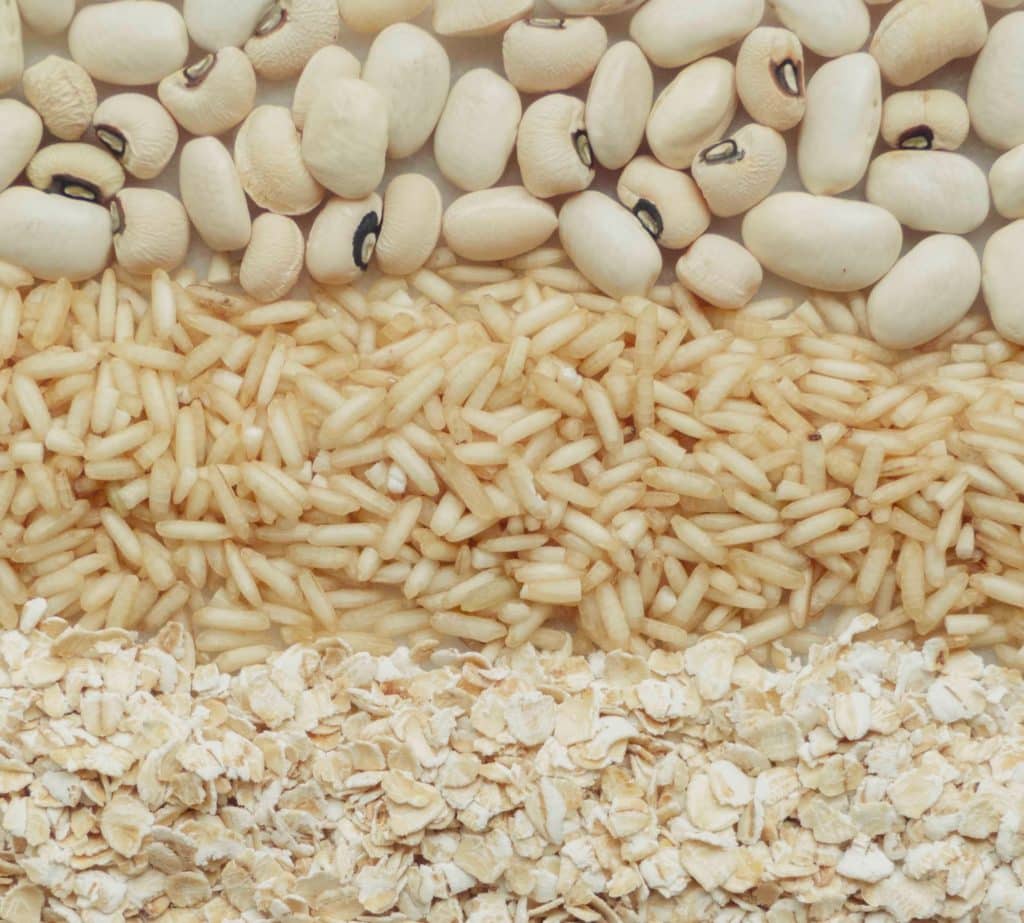
- Rice, oats, quinoa are inexpensive and can really stretch. Cooking whole grains in a rice cooker
- Beans are easy to cook, filling, and less expensive than meat. How to Cook dried Beans
- Frozen or canned veggies can improve and stretch a meal.
- Some food to have on hand that can spruce up simple fare: Dried fruits, Oils, Canned meats. Cooking with Dried Fruit
- Some high calorie for the price foods- these are foods that fill you without breaking your budget: eggs, sweet potatoes, and peanut butter. Roasted Sweet Potatoes
Stretch your Expensive Ingredients
Make the Costly Ingredients the Star, not the Bulk of the Meal
- Pre-portion food onto each plate- pre-slicing meat and filling the rest of the space with greens, veggies or grains. Family Favorite Bibimbap
- Use meat in pieces instead of whole. One chicken breast can feed an entire family if it’s used in a stir fry or casserole rather than the bulk of the meal. Chicken Stir-fry
- Cut meat in half with cooked beans or grains added in place of the meat. Porcupine Meatballs
- Cut your veggies into smaller pieces and use the entire veggie – stems, leaves, tops and all. You can also Supplement with inexpensive frozen veggies added to more expensive fresh varieties.
- Add eggs to veggies to turn both into a meal. Healthy Egg Muffin Cups
- Add pasta to a soup to bulk it out. Add a sauce to a stirfry to extend it.
- Stretch a meal with sides. Often a simple broth soup can be added to many meals to make it go further. Egg Drop Soup
- Keep breakfasts cheap. You don’t need to spend much money on this meal. A simple oat or other grain cereal, an egg or piece of bread is enough. Cream of Oatmeal
- Meal Plan! By planning your meals, you can use one ingredient for multiple meals and save money by buying in bulk or larger quantities.
Makeover Your Leftovers
Reuse your leftovers and make them new again
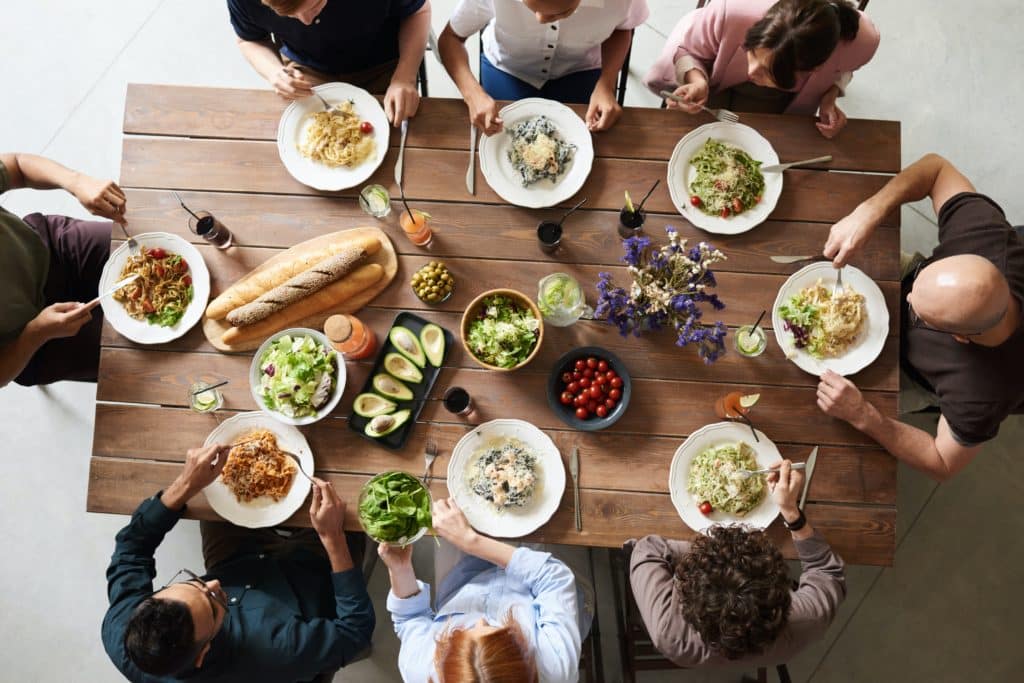
- Make it a leftover night! Buffet style: Add veggies and dip, make a green salad, or toast some old bread. Dairy-Free Veggie Dip
- Roast leftover veggies for a crispier version. Roasted Veggies
- Clean out the fridge with a stir-fry or a soup. Heat some oil, add meat if you have any and cook. Remove the meat, then cook all the veggies, starting with the hardest veggie first. Return the meat to the pot and either cover with broth or make a simple sauce. Stir-fry Formula
- Turn leftovers into a salad. You can add vegetables, meat, fruit or nuts to greens for a new meal. Kitchen Sink Salad
- Make it a Wrap. Turn a salad and stir-fry into a wrap or flatbread pizza. This is a great way to make a little into a meal. Tortilla pizzas
I hope you enjoyed this blog! Go check out the video here and download my free guide here.
Use these tips to make your food budget stretch!
Good luck and stay safe and healthy!
Dr. Michelle Jorgensen
Find this information helpful?
Subscribe to our newsletter to get the latest content from Living Well with Dr. Michelle delivered to your email inbox each week!

